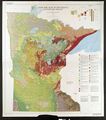Canada (nonfiction): Difference between revisions
No edit summary |
|||
| (One intermediate revision by the same user not shown) | |||
| Line 8: | Line 8: | ||
The majority of Canada has a cold or severely cold winter climate, but southerly areas are warm in summer. | The majority of Canada has a cold or severely cold winter climate, but southerly areas are warm in summer. | ||
== In the News == | |||
<gallery> | |||
File:Minnesota Quaternary geologic map.jpg|link=Minnesota (nonfiction)|[[Minnesota (nonfiction)|Minnesota]], Canada's neighbor to the South. | |||
</gallery> | |||
== Fiction cross-reference == | == Fiction cross-reference == | ||
| Line 14: | Line 20: | ||
== Nonfiction cross-reference == | == Nonfiction cross-reference == | ||
* [[Minneapolis (nonfiction)]] | * [[Minneapolis (nonfiction)]] | ||
| Line 30: | Line 32: | ||
[[Category:Nonfiction (nonfiction)]] | [[Category:Nonfiction (nonfiction)]] | ||
[[Category:Canada (nonfiction)]] | |||
[[Category:Countries (nonfiction)]] | [[Category:Countries (nonfiction)]] | ||
Latest revision as of 22:07, 8 November 2021
Canada is a country in the northern part of North America.
Canada's ten provinces and three territories extend from the Atlantic to the Pacific and northward into the Arctic Ocean, covering 9.98 million square kilometres (3.85 million square miles), making it the world's second-largest country by total area and the fourth-largest country by land area.
Canada's border with the United States is the world's longest land border.
Canada is sparsely populated, the majority of its land territory being dominated by forest and tundra and the Rocky Mountains; about four-fifths of the country's population of 35 million people live near the southern border.
The majority of Canada has a cold or severely cold winter climate, but southerly areas are warm in summer.
In the News
Minnesota, Canada's neighbor to the South.


